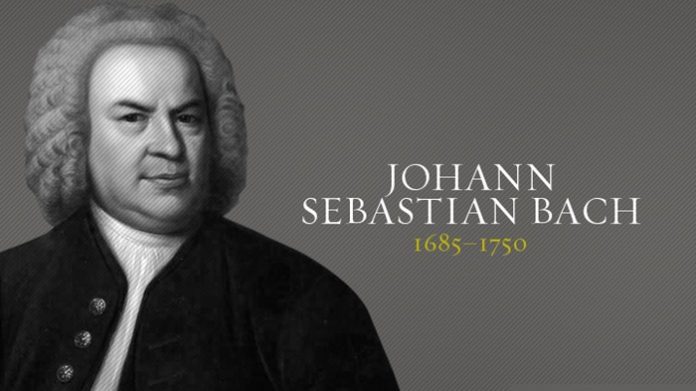Today marks the 267th anniversary of the death of Johann Sebastian Bach, who passed into eternity this day in 1750, after a rather barbaric and unsuccessful attempt at eye surgery to heal his progressive blindness.
Somewhat underappreciated during his lifetime, Bach is now recognized as one of the greatest composer in history, to some the greatest. Of course, as the Roman adage has it, de gustatibus, non disputandum est, but however one’s tastes run, from adages and adagios to arias, there is no disputing that Bach was one of the most gifted by what muses there be with unparalleled musical genius, assimilating the music came before him, from Italians such as Palestrina and Pergolesi, to his fellow Germans, Pachelbel and Buxtehude, influencing those who came after, Mozart, Haydn, and he continues to shape the course of music up to our present day.
Bach wrote in almost every musical genre: Concertos, chorales, organ, lute, harpsichord, clavier, violin, sonatas, hymns, counting well over a thousand works crafted with a mysterious skill and perfection that is still being unpacked and enjoyed. His Mass in B minor is considered the greatest chorale work ever presented. And what would we do without his foundational compositions for what we now know as the pianoforte, invented during Bach’s lifetime? The two-volume Well Tempered Clavier is the basis for all the key signatures in which future keyboard works would be written.
Bach lived a full and dramatic life, fathering twenty children by two wives (his first wife died while the composer was still relatively young), a number of whom became worthy musicians, conducting and performing many of his own and others’ works, especially on the organ, what Bach called the ‘instrument of instruments’, at which he was a master performer. Gladly enough, the Church has adopted the organ as her own: As Sacrosanctum Concilium, the Constitution on Sacred Liturgy, declares, the pipe organ is to be held in high esteem (magno in honore habeatur), for it is the traditional musical instrument which adds a wonderful splendor to the Church’s ceremonies and powerfully lifts up man’s mind to God and to higher things. (#120). Bach’s compositions are an essential part of what ‘lift out mind to God and higher things’.
We may lament the fact that Bach was not a Catholic, being raised as a devout Lutheran, but his ‘Catholic’ sympathies ran deep, and of all the Protestant religions, Lutheranism maintained perhaps most of the Catholic devotions and liturgical forms, even a belief in the Real Presence; hence, Bach’s Masses, chorales and even his unsurpassed Magnificat.
I will leave you with a thought from an address by Pope Emeritus Benedict who, as Cardinal Raztinger, in the midst of an address to the Communion and Liberation movement on beauty in 2002, wrote:
The encounter with the beautiful can become the wound of the arrow that strikes the heart and in this way opens our eyes, so that later, from this experience, we take the criteria for judgement and can correctly evaluate the arguments. For me an unforgettable experience was the Bach concert that Leonard Bernstein conducted in Munich after the sudden death of Karl Richter. I was sitting next to the Lutheran Bishop Hanselmann. When the last note of one of the great Thomas-Kantor-Cantatas triumphantly faded away, we looked at each other spontaneously and right then we said: “Anyone who has heard this, knows that the faith is true”. The music had such an extraordinary force of reality that we realized, no longer by deduction, but by the impact on our hearts, that it could not have originated from nothingness, but could only have come to be through the power of the Truth that became real in the composer’s inspiration.
Amen to that. Thank you for the musical offerings, Maestro Johann, and requiescat in pace.












